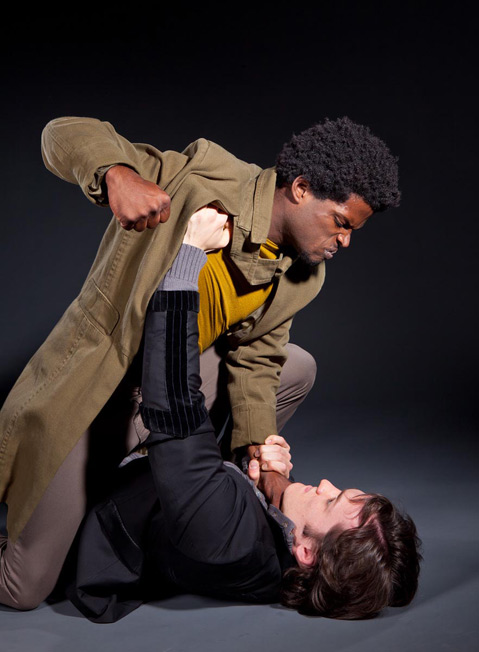UCSB Presents Hamlet
Mainstage Production Features BFA Students
Of all the thousands of lines that William Shakespeare wrote, only a handful make us think the playwright’s own voice might be heard coming through one of his characters. In Act 3, Scene 2 of Hamlet, the Prince gives advice to a troupe of players in a speech that leaves the tantalizing impression that Shakespeare the man might be speaking: “Suit the action to the word, the word to the action, with this special observance, that you o’erstep not the modesty of nature. For anything so overdone is from the purpose of playing, whose end, both from the first and now, was and is, to hold, as ‘twere, the mirror up to nature; to show virtue her own feature, scorn her own image, and the very age and body of the time his form and pressure.”

In the fully staged production of Hamlet that opens this weekend at UCSB, the highly trained young cast will dare to come as close as possible to this exalted status, in which action and words are one and the same. For these top students in the university’s bachelor of fire arts (BFA) Theater program, Hamlet is the culmination of years of training and study, and represents the opportunity of a lifetime to give everything they’ve got to the playing of the world’s most famous drama. I spoke with Irwin Appel, the UCSB professor who is directing, last week at his office on campus.
Wow, Hamlet. How important is this production, and what are you doing with it that’s new? It’s a big one for us. I’m not only directing; I also contributed new music and sound design for the show. I wrote melodies for Ophelia’s songs and several of the players will sing. There’s a moment when Ophelia’s song comes back as music from a music box, and there’s a soundscape as well to indicate the eeriness of certain scenes. There’s even a fanfare I wrote for the ghost.
Did you do anything unusual to prepare? Yes, last December I made a pilgrimage to some of the key sites. I got on a plane and went to Stratford-upon-Avon to visit the Shakespeare properties there, and then I went on to Helsingor to visit Kronborg, the castle on which Shakespeare based Elsinore. That part of the trip had a profound impact on my vision for the production.
Hamlet is an extremely modern play, but it is also really about castles and kings, and Kronborg/Elsinore gave me that sense of scope, of a world that would involve that kind of scale for individual action. What I realized there was that the play should be at once intimate and epic, and that concept has been at the core of my vision ever since.
As you’ll see when you visit the theater, what we’ve built for a set involves lots of implied structure. There’s a thrust now that comes out into the audience and covers a good part of the front row, and this will let us do certain things that I hope will realize my vision. My objective is to capture Hamlet’s “infinite space” in a theatrical setting.
So are you following through on the theatrical metaphor in your production design? When Shakespeare’s dramas are really working, they upend our expectations of what is substantial and what is not. We tend to think it’s the buildings and the walls that are there, but what Shakespeare shows is that it’s really the conversation that is permanent, and not the place in which it happens. It’s like the famous speech of Prospero in Act 4 of The Tempest—the one that begins with “Our revels now are ended.” In that speech he says, “the great globe itself, Yea, all which it inherit, shall dissolve.” He’s talking about the Globe there, and he’s saying that what’s important is not the theater, but the words spoken in it, and what they signify.
4•1•1
Hamlet will be presented in UCSB’s Hatlen Theatre. Performances are Friday-Saturday, May 20-21, at 8 p.m.; Thursday-Saturday, May 26-28, at 8 p.m.; and on Sunday, May 22, at 2 p.m. For tickets and information call 893-7221 or visit www.theaterdance.ucsb.edu.



